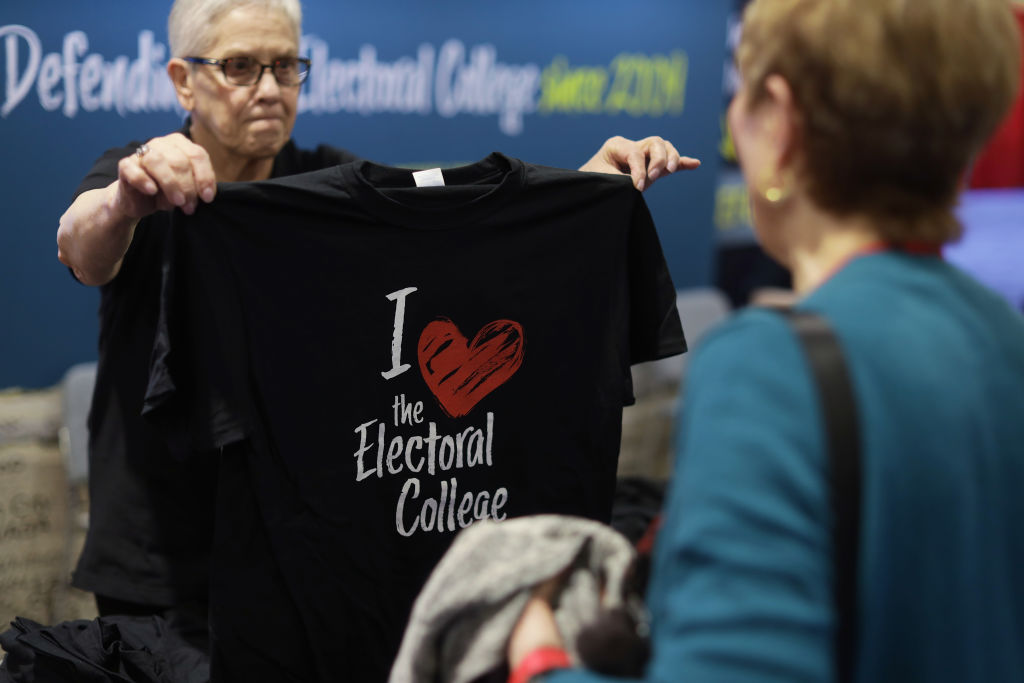How Texas could be the linchpin in finally dismantling the Electoral College


A free daily email with the biggest news stories of the day – and the best features from TheWeek.com
You are now subscribed
Your newsletter sign-up was successful
A little over a week from Election Day "and everyone with bated breath," columnist Peggy Noonan writes in Friday's Wall Street Journal. Whoever wins, "the changes in how we vote, from early voting to voting by mail, all hastened by the pandemic, will have been established after this election, and won’t go away. This will make things appear more democratic and may leave them more Democratic. Progressive preoccupation with the Electoral College is about to diminish, sharply."
No, Republicans should become preoccupied, too, Jesse Wegman argued on Thursday's The Daily podcast. The framers of the Constitution set up the Electoral College because they had to invent a way to "pick the leader of a self-governing republic" and were worried "most people wouldn't know national political candidates," he explained. But they never even discussed today's winner-takes-all system, "and when they saw it start to be adopted in the states in the early 1800s, they were horrified. James Madison, the man we think of as the father of the Constitution, tried to pass a constitutional amendment prohibiting the use of winner-take-all rule because he saw how corrosive it was to erase up to half of voters in the state."
Madison failed, but Sen. Birch Bayh (D-Ind.) almost got a constitutional amendment enacted in 1969 — President Richard Nixon was on board, it had broad national support, the House approved the amendment, and nearly three-quarters of states were set to approve it, Wegman said. Sadly, "three Southern segregationist senators" filibustered it to death in 1970, killing "the best effort we've ever had in American history to abolish the Electoral College."
The Week
Escape your echo chamber. Get the facts behind the news, plus analysis from multiple perspectives.

Sign up for The Week's Free Newsletters
From our morning news briefing to a weekly Good News Newsletter, get the best of The Week delivered directly to your inbox.
From our morning news briefing to a weekly Good News Newsletter, get the best of The Week delivered directly to your inbox.
This only became a partisan issue after George W. Bush then Donald Trump won the Electoral College while losing the popular vote, but it's a double-edged sword, Wegman said. "Right now what we're seeing is some really big and important Republican-majority states are shifting demographically." Texas, with its 38 electoral votes, "is going to turn blue" as soon as 2024, he predicted, and "if Republicans can't win Texas, I think their paths to an Electoral College victory are basically eliminated."
In the next eight years, "when both parties have suffered enough in a short enough time period that they realize that it doesn't help anybody," Wegman said, "I think we have the opening to switch to a system in which everybody counts equally, and everybody's vote matters." Listen to Wegman's entire argument at The New York Times.
A free daily email with the biggest news stories of the day – and the best features from TheWeek.com
Peter has worked as a news and culture writer and editor at The Week since the site's launch in 2008. He covers politics, world affairs, religion and cultural currents. His journalism career began as a copy editor at a financial newswire and has included editorial positions at The New York Times Magazine, Facts on File, and Oregon State University.
-
 Political cartoons for February 21
Political cartoons for February 21Cartoons Saturday’s political cartoons include consequences, secrets, and more
-
 Crisis in Cuba: a ‘golden opportunity’ for Washington?
Crisis in Cuba: a ‘golden opportunity’ for Washington?Talking Point The Trump administration is applying the pressure, and with Latin America swinging to the right, Havana is becoming more ‘politically isolated’
-
 5 thoroughly redacted cartoons about Pam Bondi protecting predators
5 thoroughly redacted cartoons about Pam Bondi protecting predatorsCartoons Artists take on the real victim, types of protection, and more
-
 Nobody seems surprised Wagner's Prigozhin died under suspicious circumstances
Nobody seems surprised Wagner's Prigozhin died under suspicious circumstancesSpeed Read
-
 Western mountain climbers allegedly left Pakistani porter to die on K2
Western mountain climbers allegedly left Pakistani porter to die on K2Speed Read
-
 'Circular saw blades' divide controversial Rio Grande buoys installed by Texas governor
'Circular saw blades' divide controversial Rio Grande buoys installed by Texas governorSpeed Read
-
 Los Angeles city workers stage 1-day walkout over labor conditions
Los Angeles city workers stage 1-day walkout over labor conditionsSpeed Read
-
 Mega Millions jackpot climbs to an estimated $1.55 billion
Mega Millions jackpot climbs to an estimated $1.55 billionSpeed Read
-
 Bangladesh dealing with worst dengue fever outbreak on record
Bangladesh dealing with worst dengue fever outbreak on recordSpeed Read
-
 Glacial outburst flooding in Juneau destroys homes
Glacial outburst flooding in Juneau destroys homesSpeed Read
-
 Scotland seeking 'monster hunters' to search for fabled Loch Ness creature
Scotland seeking 'monster hunters' to search for fabled Loch Ness creatureSpeed Read
